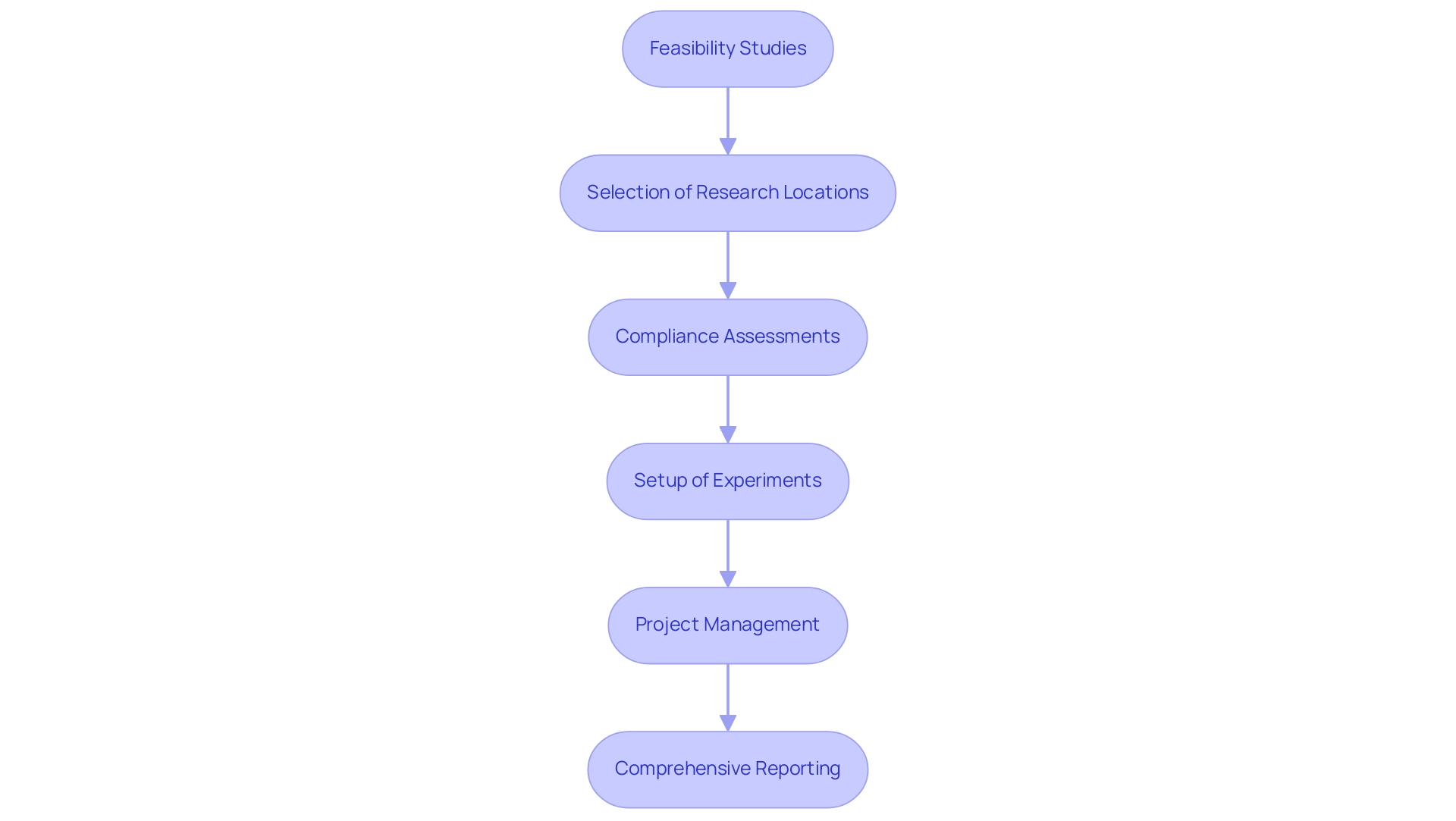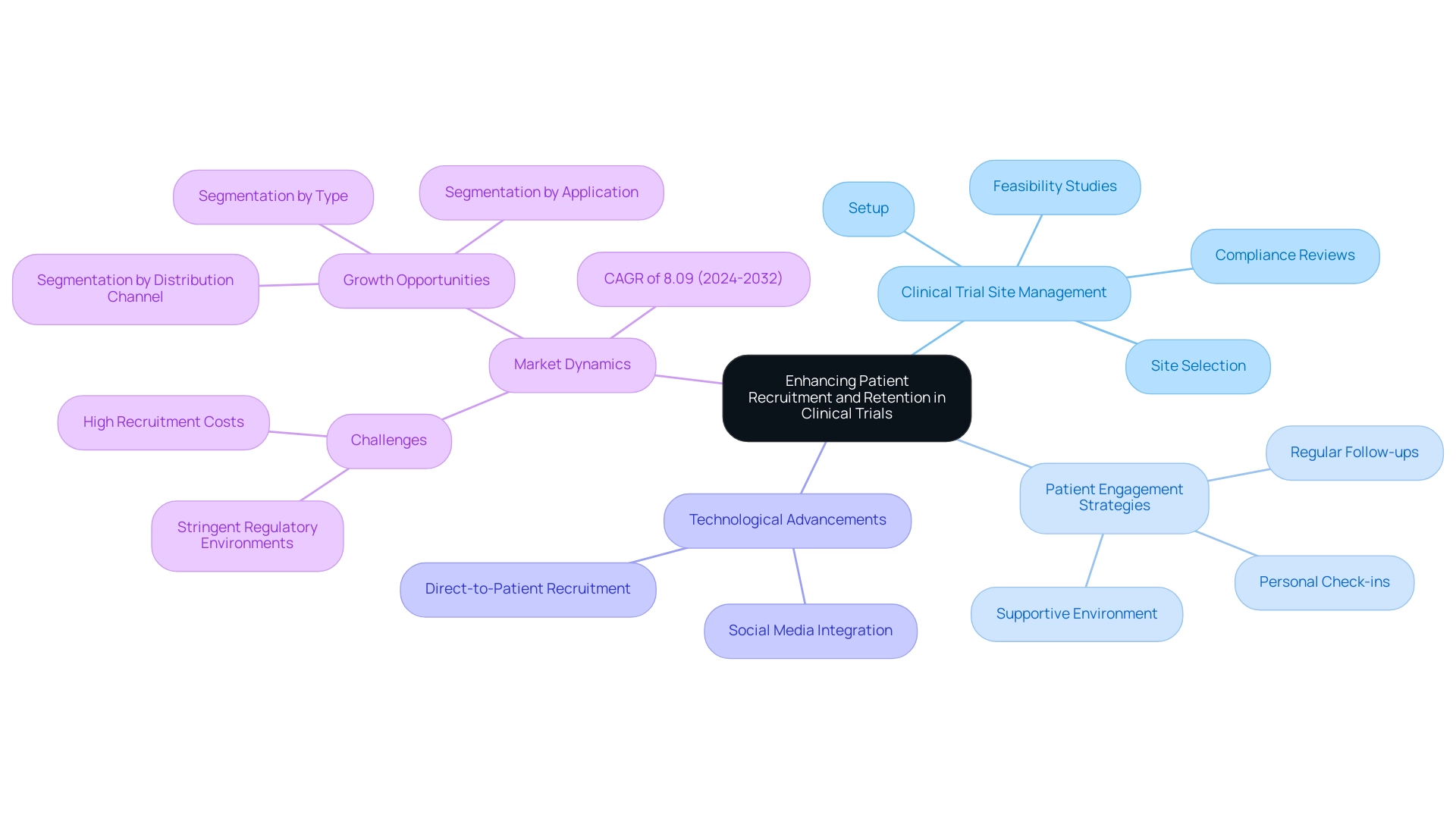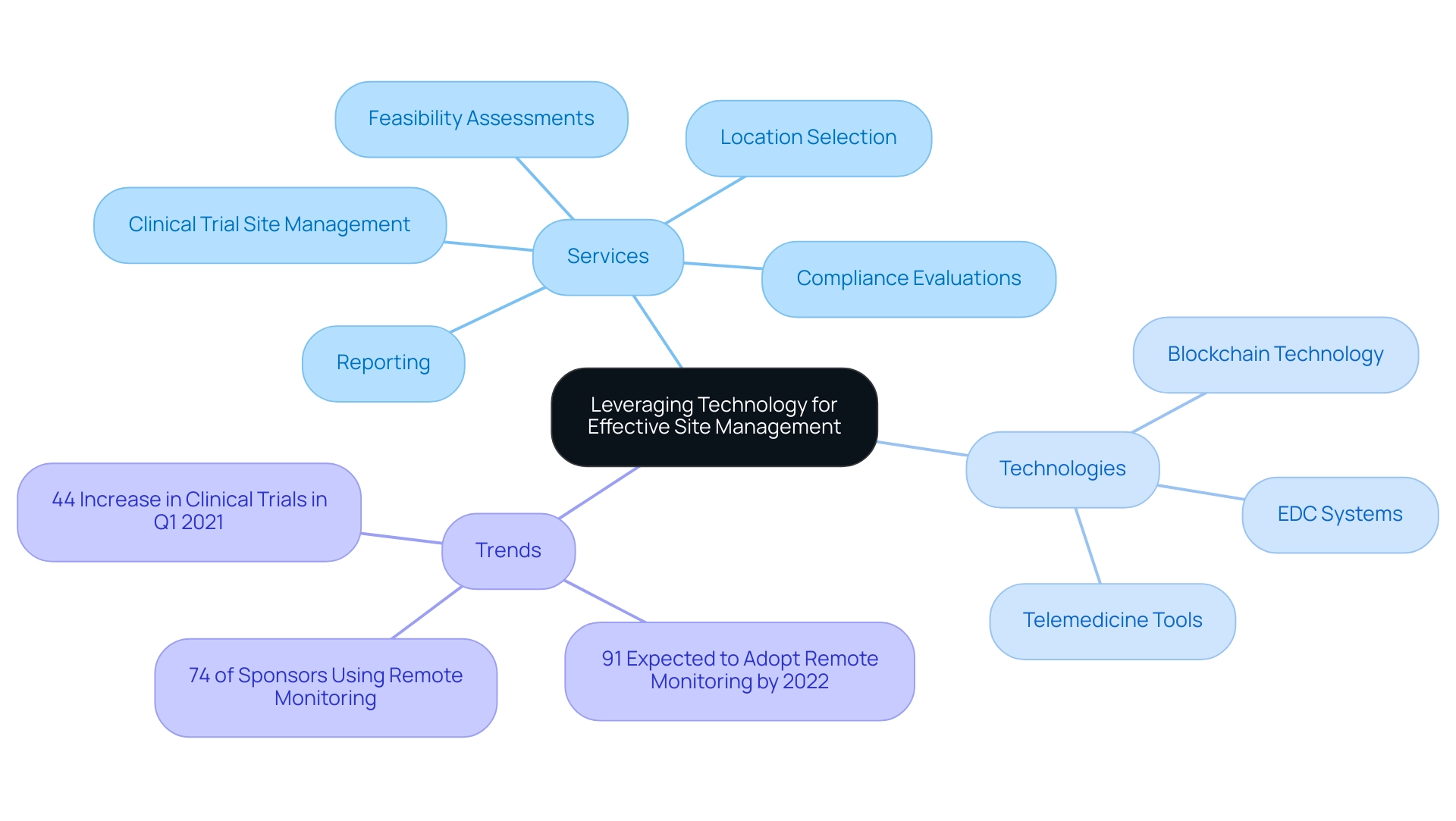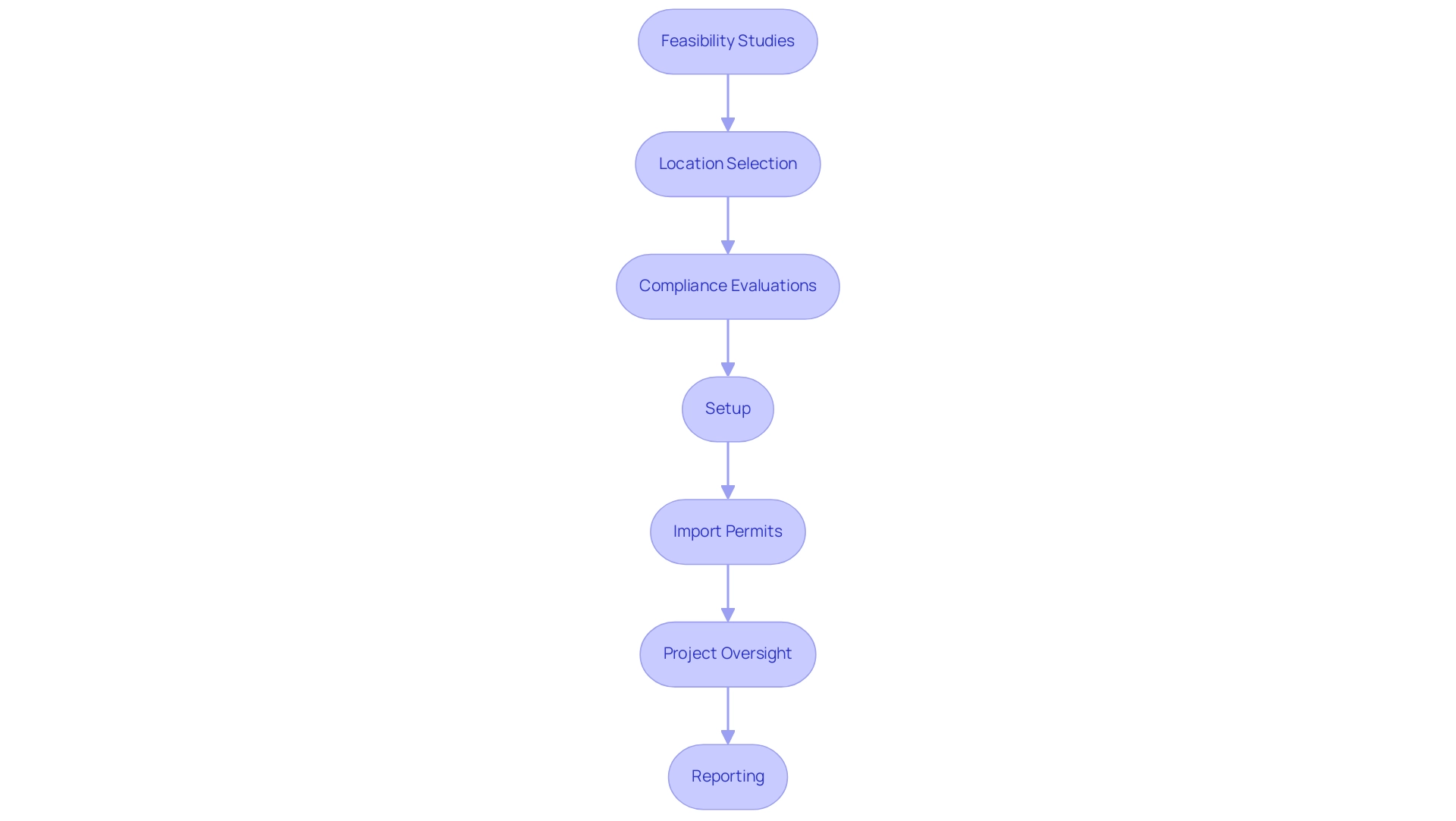Overview
The article outlines best practices for clinical trial site management, emphasizing the importance of effective communication, compliance with Good Clinical Practice (GCP) guidelines, and the integration of technology to enhance operational efficiency. It supports these points by discussing the necessity of feasibility studies, regular audits, and the adoption of digital tools, which collectively contribute to improved data integrity, patient recruitment, and overall research quality.
Introduction
In the realm of clinical research, the management of trial sites plays a pivotal role in determining the success of studies and the integrity of their outcomes. This multifaceted discipline encompasses a range of activities, from feasibility assessments and site selection to compliance monitoring and detailed reporting. As clinical trials become increasingly complex and regulated, the need for skilled site managers who can navigate these challenges effectively has never been more critical.
With the integration of advanced technologies and adherence to Good Clinical Practice (GCP) guidelines, site managers are not only tasked with ensuring operational efficiency but also with fostering collaboration among sponsors, investigators, and regulatory bodies.
This article delves into the essential practices and innovations that enhance clinical trial site management, highlighting the significance of effective communication, patient recruitment strategies, and technological advancements in optimizing research outcomes.
Understanding the Role of Clinical Trial Site Management
Oversight of clinical trial site management is a vital element of effective clinical studies, involving a broad range of tasks that guarantee the seamless implementation of research. Our service capabilities encompass:
- Feasibility studies
- Selection of research locations and primary investigators
- Compliance assessments
- Setup of experiments
- Project management
- Comprehensive reporting on study status, inventory, and adverse occurrences
In the realm of clinical trial site management, site managers are tasked with coordinating all operational facets of a study, ensuring regulatory compliance with authorities such as INVIMA, managing budgets, and allocating resources efficiently.
Their role in clinical trial site management is vital for fostering effective communication among sponsors, investigators, and regulatory bodies, which enhances collaboration and ultimately improves the quality of research outcomes. A strong understanding of Good Clinical Practice (GCP) guidelines is essential for managers in clinical trial site management, as adherence to these principles is crucial in maintaining the integrity of clinical studies. Moreover, experts like Dr. Juan Cuya, MD, emphasize the importance of such guidelines, particularly with anticipated updates for 2024 that may refine existing practices.
The effect of GCP compliance on study results is substantial; research has demonstrated that clinical trial site management at effectively managed locations produces higher quality data, leading to more trustworthy conclusions. Additionally, the traditional cut-point of 0.05 for p-values is arbitrary, with little difference in evidence of effect between p-values of 0.052 and 0.048, underscoring the need for careful statistical consideration in study management. Time limitations and the need for statisticians can obstruct effective communication in research settings, presenting challenges that managers must navigate.
Moreover, subgroup analyses in research studies, while crucial for assessing treatment effects in particular patient groups, are prone to biases and should be pre-defined to prevent data dredging. As the terrain of medical research changes, professionals involved in clinical trial site management must stay alert and knowledgeable to handle the intricacies of their duties efficiently, aiding in job creation and economic development in local communities.

Best Practices for Optimizing Clinical Trial Site Management
Efficient communication pathways are essential in enhancing clinical trial site management, as they enable prompt resolution of arising issues. Our comprehensive service capabilities in clinical trial site management include:
- Feasibility studies
- Selection of research sites and principal investigators (PIs)
- Compliance reviews
- Setup
- Import permits
- Project management
- Reporting
This holistic approach is essential for regulatory success and scientific rigor in clinical trial site management within clinical studies.
The statistic that 75% of respondents reported multiple reviews of trial reports underscores the necessity of collaboration in clinical trial site management, as effective communication ensures that all parties remain aligned and informed throughout the process. Regular meetings and updates are crucial in this regard. Implementing a robust project management system in clinical trial site management enhances the ability to track milestones and deadlines, allowing all team members to stay on course.
Training staff on specific protocols and technologies is essential; when equipped with the right knowledge, team members can perform their roles more efficiently. Additionally, fostering a culture of accountability and feedback contributes to ongoing improvements in clinical trial site management practices and processes. The significance of Source Data Verification (SDV), as outlined in the International Conference on Harmonization (ICH) Good Clinical Practice (GCP) guidelines, exemplifies the necessity of rigorous onsite monitoring to ensure data accuracy.
SDV functions as a conventional method of oversight that meets ICH-GCP standards, thereby bolstering the scientific integrity of research studies. By incorporating these best practices in clinical trial site management, including our abilities to guarantee regulatory success in Latin America, research studies can attain higher success rates and maintain the scientific rigor crucial to their findings. As Lauren Houston aptly stated, 'This survey highlights the diversity of data quality practices in Australia,' which emphasizes the need for standardized approaches across locations to reduce variability and enhance data integrity.
Enhancing Patient Recruitment and Retention in Clinical Trials
Successful patient recruitment and retention in clinical studies depend on a multifaceted approach that emphasizes clear communication and accessibility, supported by extensive clinical trial site management. This encompasses:
- Feasibility studies
- Site selection
- Compliance reviews
- Setup
These are essential components of clinical trial site management to ensure that studies meet regulatory requirements and facilitate successful outcomes. Creating informational materials that clearly outline the study's purpose and potential benefits is essential for participant understanding.
The integration of social media platforms and community outreach initiatives significantly boosts visibility, facilitating access to a diverse patient population. As noted by Jill Pellegrino, CEO of AutoCruitment, 'Our targeted direct-to-patient recruitment allows us to unlock access and get access to a large population, or enhanced qualification services.' This method not only draws in but also guarantees that the most qualified patients are involved in the process.
Additionally, executing participant engagement strategies, such as regular follow-ups and personal check-ins, plays a crucial role in sustaining interest and commitment throughout the testing period. Creating a supportive environment that actively addresses patient concerns and solicits feedback can markedly enhance retention rates, which is crucial for the successful completion of studies amidst the prevailing challenges of high recruitment costs and stringent regulatory environments. The medical study participant recruitment services market is divided by type, application, and distribution channel, enabling organizations to pinpoint growth opportunities suited to their strategies.
Furthermore, comprehending the dynamics of the medical study patient recruitment market shows that although challenges such as regulatory obstacles and elevated expenses remain, technological progress and cooperation between pharmaceutical firms and CROs are leading to innovative recruitment solutions. With regulatory oversight from institutions like INVIMA in Colombia, research organizations can confidently navigate these complexities and position themselves favorably within a market projected to grow at a steady CAGR of 8.09% from 2024 to 2032. Furthermore, efficient clinical trial site management, including project oversight and monitoring throughout the testing process, is essential for upholding compliance and guaranteeing timely reporting of study status and adverse events.
Media attention on research studies in Latin America, especially in Colombia, underscores the increasing interest and investment in this field, further highlighting the significance of strong clinical trial site management in ensuring effective oversight services.

Leveraging Technology for Effective Site Management
Utilizing technology is crucial for enhancing the effectiveness of clinical trial site management. Our extensive healthcare study coordination services, which include:
- Clinical trial site management
- Feasibility assessments
- Location selection
- Compliance evaluations
- Thorough reporting on research status, inventory, and serious and non-serious adverse occurrences
also encompass review and feedback on research documents to meet national regulations, study setup, and import permits. Electronic data capture (EDC) systems play a pivotal role by streamlining data collection processes and significantly reducing errors associated with manual data entry.
A striking 74% of sponsors have already embraced remote monitoring, with an expectation that 91% will adopt similar practices by the end of 2022, indicating a robust shift towards digital solutions. Ongoing efforts to adopt Fast Healthcare Interoperability Resources (FHIR) standards for electronic healthcare information exchange further highlight the technological advancements in clinical research. Project oversight software improves clinical trial site management by allowing efficient monitoring of progress, handling timelines, and optimizing resource distribution.
Telemedicine tools, which facilitate virtual visits, not only ease patient participation but also enhance retention rates throughout the study process. Furthermore, utilizing sophisticated analytics software in clinical trial site management allows site supervisors to assess recruitment approaches and operational efficiency, facilitating data-informed choices that enhance overall project oversight. As highlighted by Stanton et al., 'The pace of recognizing candidates for the urgent management of medical conditions is another area of potential identified in the literature for the application of virtual messaging digital technology in research recruitment.'
The rise in medical studies in Q1 2021 compared to Q1 2020, propelled by the COVID-19 vaccine deployment, emphasizes the urgency for embracing digital solutions in study oversight. A case study on digital methods for recruiting stroke survivors demonstrated that digital promotion could lead to quicker recruitment compared to traditional methods, underscoring the effectiveness of these online strategies. Furthermore, blockchain technology is being investigated for enhancing data integrity and security in research studies, further highlighting the significance of data protection in the realm of technology implementation.

Ensuring Compliance and Quality in Clinical Trial Management
To maintain adherence and excellence in research study oversight, the execution of strong quality assurance protocols is essential. Our extensive research management services, particularly in clinical trial site management, include:
- Feasibility studies
- Location selection
- Compliance evaluations
- Setup
- Import permits
- Project oversight
- Reporting
This ensures that every aspect of the research process is meticulously addressed. Regular audits and systematic monitoring of study conduct are instrumental in identifying potential compliance issues before they escalate.
Effective training programs focusing on regulatory requirements and ethical considerations are essential; research teams well-versed in these areas are significantly better positioned to adhere to industry standards. Furthermore, establishing a meticulous documentation process ensures that all trial-related activities are accurately recorded, enhancing transparency and accountability. By prioritizing adherence and quality control within clinical trial site management, site managers not only enhance the credibility of their studies but also nurture trust among stakeholders, reinforcing the integrity of the research process.
Significantly, a survey indicated that 77% of corporate risk and compliance experts consider remaining informed about the latest ESG-related advancements essential, emphasizing the need for ongoing enhancement and attentiveness in overseeing compliance in research projects. Additionally, the use of conflict of interest management software can streamline compliance efforts and enhance transparency in research activities. A practical illustration of quality assurance in medical trials can be seen in the case study titled 'Examples of Informed Consent in Research,' which highlights the importance of obtaining and documenting consent.
This case study demonstrates the application of our services in ensuring ethical compliance. Experts like Katherine Ruiz and Ana Criado lend their regulatory insights, ensuring our services remain at the forefront of medical device and clinical research innovation in Latin America.

Conclusion
In summary, effective clinical trial site management is essential for ensuring the success and integrity of clinical research. The multifaceted role of site managers encompasses a wide range of activities, including:
- Feasibility assessments
- Regulatory compliance
- Detailed reporting
A strong adherence to Good Clinical Practice (GCP) guidelines is crucial, as it directly influences the quality of data and overall outcomes of clinical trials. By fostering collaboration and maintaining open communication among sponsors, investigators, and regulatory bodies, site managers can significantly enhance the operational efficiency of studies.
Furthermore, optimizing patient recruitment and retention strategies is vital in navigating the complexities of modern clinical trials. Implementing clear communication, utilizing social media for outreach, and creating supportive environments for participants can lead to improved engagement and successful trial completions. The integration of technology also plays a pivotal role in streamlining processes, reducing errors, and enhancing data management through electronic systems and telemedicine tools.
Ultimately, the commitment to compliance and quality assurance in clinical trial management not only safeguards the integrity of research but also builds trust among stakeholders. As the landscape of clinical research continues to evolve, the importance of skilled site managers and innovative practices will remain paramount in driving the success of clinical trials and advancing medical knowledge for the benefit of society.
Frequently Asked Questions
What is the role of clinical trial site management?
Clinical trial site management involves overseeing all operational aspects of a study, ensuring regulatory compliance, managing budgets, and allocating resources efficiently.
What are the key tasks involved in clinical trial site management?
Key tasks include feasibility studies, selection of research locations and principal investigators, compliance assessments, setup of experiments, project management, and comprehensive reporting on study status and adverse occurrences.
Why is Good Clinical Practice (GCP) important in clinical trial site management?
Adherence to GCP guidelines is crucial for maintaining the integrity of clinical studies, ensuring high-quality data, and fostering effective communication among sponsors, investigators, and regulatory bodies.
How does GCP compliance affect study results?
GCP compliance at well-managed sites leads to higher quality data, resulting in more trustworthy conclusions from clinical trials.
What challenges do site managers face in clinical trial site management?
Challenges include time limitations, the need for statisticians, and ensuring effective communication in research settings.
What is the significance of subgroup analyses in clinical studies?
Subgroup analyses are important for assessing treatment effects in specific patient groups but can introduce biases if not pre-defined, which helps prevent data dredging.
How can effective communication improve clinical trial site management?
Efficient communication pathways allow for prompt resolution of issues, ensuring all parties remain aligned and informed throughout the trial process.
What is Source Data Verification (SDV) and why is it important?
SDV is a method of oversight that ensures data accuracy and meets ICH-GCP standards, thereby enhancing the scientific integrity of research studies.
What are the benefits of implementing a robust project management system in clinical trials?
A robust project management system helps track milestones and deadlines, ensuring that all team members stay on course and contribute to regulatory success and scientific rigor.
How can training and a culture of accountability improve clinical trial site management?
Training staff on specific protocols and technologies enhances efficiency, while fostering a culture of accountability and feedback leads to ongoing improvements in management practices.




